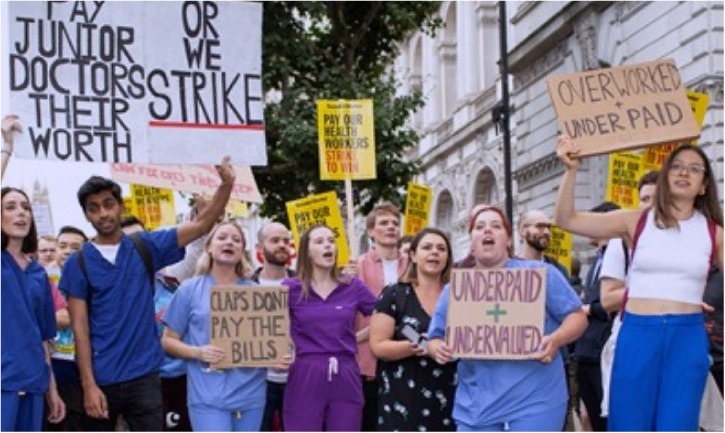
Thousands of junior doctors in England are planning a four-day strike, which could lead to a quarter-million medical appointments being postponed. The strike is part of a series of labor actions taken by public sector workers in response to the lack of pay hikes to offset the inflation that exceeds 10%. The strikes have affected workers across the country, as they struggle to pay bills due to a cost-of-living crisis driven by sharp increases in food and energy prices, while union wages have fallen in real terms over the past decade.
Last month, a three-day walkout by junior doctors led to the postponement of 175,000 appointments and procedures, and the upcoming strike is expected to have a greater impact. The strikes have also led to widespread disruption and inconvenience for Britons, with passport office workers beginning a five-week strike and security officers at Heathrow Airport walking off the job for ten days. Strikes by train and bus drivers, postal workers, ambulance drivers, and nurses have also caused chaos across the country.
The British Medical Association (BMA) has said that junior doctors have lost over 26% in pay in real terms over the past 15 years, and the strikes could be avoided if the government makes a reasonable offer. However, the Department of Health and Social Care has insisted that the strikes be called off before negotiations can take place.
Dr. Layla McCay, policy director at the National Health Service (NHS) Confederation, has stated that the impact of the upcoming strike is expected to be significant and may lead to patient safety issues, making it a significant concern for health care leaders. Teachers have also planned strikes in late April and early May, creating further difficulties for parents and pupils.
The situation highlights the need for effective negotiations to resolve pay disputes and address the cost-of-living crisis that is impacting workers across the country. It is crucial to address these issues to ensure the welfare of workers and to prevent further disruptions that could affect the health and well-being of the general public.
The British Medical Association (BMA) stated that junior doctors have lost more than 26% in pay in real terms over the past 15 years. They believe that the strikes could be avoided if the government makes a reasonable offer. However, the Department of Health and Social Care has insisted that the strikes be called off before negotiations can take place. This hardline stance is unlikely to help resolve the ongoing dispute between the government and public sector workers.
The strikes by junior doctors and other public sector workers have led to widespread disruptions and inconvenience for Britons. In addition, teachers have planned strikes in late April and early May, creating further difficulties for parents and pupils. The current situation demonstrates the need for effective negotiations to resolve pay disputes and address the cost-of-living crisis that is impacting workers across the country.
The strikes have also highlighted the challenges facing the National Health Service (NHS), which is already under considerable strain due to the COVID-19 pandemic. The NHS has struggled to meet demand for medical services in recent months, and the strike by junior doctors is likely to make things even more difficult. The BMA has stated that the strikes will only be called off if the government makes a reasonable offer.
The Department of Health and Social Care has insisted that the strikes be called off before negotiations can take place. However, this stance is unlikely to resolve the dispute. The government needs to recognize the importance of public sector workers and work to address the cost-of-living crisis that is affecting workers across the country.
The current situation demonstrates the importance of effective negotiations in resolving pay disputes and addressing the cost-of-living crisis. The government needs to recognize the contribution of public sector workers and work towards a resolution that is fair for everyone.
The planned strike by tens of thousands of junior doctors in England is likely to have a significant impact on the National Health Service and patient safety. The strike is part of a series of labor actions taken by public sector workers demanding pay hikes to offset inflation that exceeds 10%.
The government’s hardline stance is unlikely to resolve the ongoing dispute, and effective negotiations are needed to address the cost-of-living crisis that is impacting workers across the country. The situation highlights the importance of recognizing the contribution of public sector workers and working towards a resolution that is fair for everyone.
